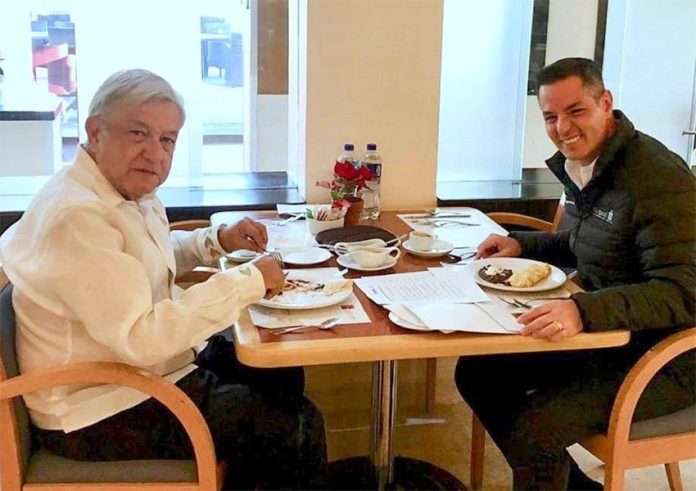President López Obrador announced Saturday that the federal government will invest 2.5 billion pesos (US $125.8 million) in 2019 to pave roads in Oaxaca.
At an event in the state’s Sierra Norte region, the leftist president said that he doesn’t want private companies to do the work but local residents.
The government’s aim is to better connect rural communities to larger towns while simultaneously creating local jobs.
“Of the 570 municipalities in Oaxaca, fewer than 300 have paved roads to their municipal seats . . .” López Obrador said.
The president charged that he has inherited a machinery of government from the past administration that is like an “old rheumatic bull that moves slowly,” hampering the delivery of funds.
But López Obrador pledged that his government will deliver the money directly to communities in a timely manner while also ensuring that there is no corruption.
At Saturday’s event in the municipality of San Juan Evangelista Analco, he handed out checks to some local authorities.
“. . . If we deliver the resources and they are managed well, you help me to govern. That’s democracy,” López Obrador said.
He explained that the federal government will continue to provide funding in subsequent years up to a ceiling of 14 billion pesos (US $704 million) so that all roads in Oaxaca are paved.
The funds, he said, were can be provided because “there’s no corruption anymore, there are no luxuries [and] the presidential plane has gone.”
The Morena party leader called on state residents to leave their disagreements and differences to one side and instead unite and work together for the development of Mexico.
The funding for unpaved roads in Oaxaca is part of the federal government’s 78-billion-peso (US $3.9-billion) National Highway Infrastructure Program, which intends to build new roads, finish incomplete projects and maintain existing highways.
López Obrador described Mexico as a “public works cemetery,” and pledged that his government will complete unfinished projects including an upgrading of the Isthmus of Tehuantepec highway between Salina Cruz, Oaxaca, and Coatzacoalcos, Veracruz, and the Mexico City-Toluca passenger train.
Zedric Ivan Escalante, an undersecretary in the Secretariat of Communications and Transportation (SCT), said the government’s investment in infrastructure would generate 800,000 direct and 200,000 indirect jobs.
Also present at the announcement was Oaxaca Governor Alejandro Murat, who acknowledged that past presidents hadn’t visited the Sierra Norte region of the state in recent years to which many of those in attendance responded, “neither have you.”
Murat, who governs for the Institutional Revolutionary Party (PRI) that was unceremoniously tossed out of federal power at the July 1 election, was booed throughout his appearance and labelled a “thief.”
López Obrador defended the governor, saying that while he respected the people’s “dissidence,” what Mexico needs is unity.
“. . . Are we going to keep fighting? The homeland is first. As young people say: Ya chole [that’s enough] of that. We’re all going to unite.”
Source: Expansión (sp), Milenio (sp), El Universal (sp)
